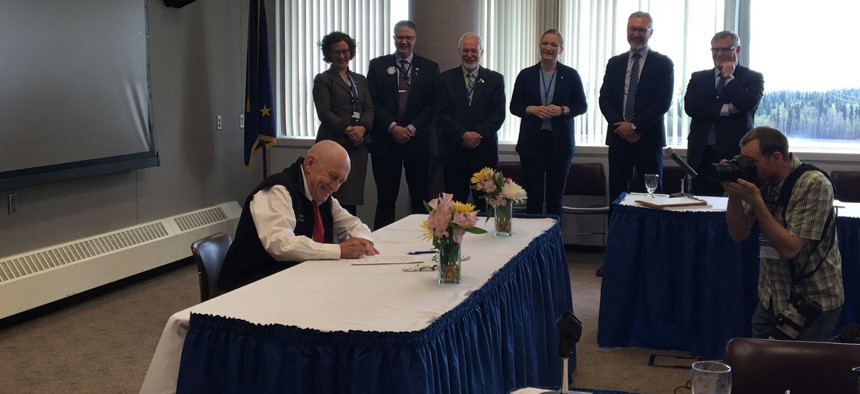Arctic Mayors Gather to Discuss Common Challenges Living in the Far North

Mayor Richard Beneville of Nome, Alaska David McGlinchey
“We are so much alike in our issues. We have an understanding, and an empathy,” according to the mayor of Nome, Alaska.
This is part of an ongoing series of Route Fifty dispatches from Alaska.
FAIRBANKS, Alaska — As the Arctic Council’s national delegation morning meetings ran long on Thursday participants in an afternoon mayoral roundtable waited for a few tardy attendees who were needed at both events.
It was an appropriate metaphor, said Anchorage Mayor Ethan Berkowitz, that the group was “starting our meeting a little bit late because we’re waiting for the national delegations to get their act together.”
The room laughed and nodded with understanding—the beginning of the inaugural Arctic Mayors Roundtable, which felt partly like a summit of civic leaders and partly a warm gathering of friends. There were many hugs instead of handshakes, and facilitator Christin Kristoffersen, former mayor of the Norwegian town of Longyearbyen, introduced Berkowtiz as “Mayor Ethan.”
“We’re going to use first names,” Kristoffersen said. “We’re going to do this the Arctic way.”
The Arctic Council Ministerial meetings are held every two years, and feature representatives from all eight Arctic countries—Canada, Denmark, Iceland, Finland, Norway, Sweden, Russia, and the United States.
After U.S. Secretary of State Rex Tillerson and his counterparts haggled over a much-discussed joint statement in the public eye, the mayors efficiently worked through their own joint declaration of priorities with surprising ease and little disagreement—on issues that ranged from climate change to economic development.
“We who live in the far north know the challenges,” said Nome Mayor Richard Beneville. Nome has about 3,800 residents, and sits on the Seward Peninsula, jutting out into the Bering Sea. It is not connected by road to any other community. Beneville said that the mayors’ group bonded over issues like energy costs, and the challenges faced by indigenous communities. “We are so much alike in our issues. We have an understanding, and an empathy.”
The event was in part driven by the Institute of the North, a nonprofit based in Anchorage. In an organizing document, the Institute offered to serve as the secretariat for a longer-term forum that could offer Arctic-specific capacity building, and help municipalities be more effective in shaping regional and national policy.
“One of the things that’s remarkable is how quickly mayors can come to agreement and how clear the concerns and the principles are over addressing issues in the Arctic,” Berkowitz said. “In the north we depend on each other and that is part of the culture. Regardless of our passport we can count on each other.”
Unalaska Mayor Frank Kelty agreed that the common issues and shared priorities cut across countries and cultures.
With about 4,500 residents, Unalaska is the largest city in the Aleutian Islands, which stretch for 1,200 miles off the southwest coast of Alaska. The city is home to Dutch Harbor, which is featured in the Discovery Channel show “Deadliest Catch.”
Kelty said that he appreciated hearing from Madeleine Redfern, mayor of Iqaluit on Baffin Island, in the Canadian territory of Nunavut.
“This was great to get to meet with these people, to meet these mayors. I really enjoyed hearing from the mayor from Baffin Island,” Kelty said. “No fiber optic. High cost of energy. High cost of transportation. It’s the same issues we face on my island in the Bering Sea. My ticket to get here cost $1,400.”
Beneville, who also runs a tourism company in Nome, agreed that transportation in the Arctic was a huge and shared challenge.
“If people can get there, they will go,” he said.
The joint statement mirrored those shared priorities, and the discussions were supportive and positive. The entire meeting read through the draft as it was projected onto a large screen. When changes or edits were made, Kristoffersen, the facilitator, would ask “no thumbs down?” There were not any, and the drafting moved forward apace.
The final document zeroed in on specific issues, but also talked about high-level connections between the far-flung communities.
“As peoples of the Arctic, we face unique challenges including a rapidly transforming economy, a remoteness and isolation that creates an urgent need for cooperation and collaboration between communities, and a climate that is changing at twice the rate of the rest of the world,” the joint statement read. “Local government in the circumpolar region has a special role—to deliver essential public services, convey the priorities of residents at the most fundamental level to regional, national, and international decision-makers; and work to ensure that the community itself is resilient and sustainable in the long term.”
Several mayors involved in the meetings said that they believed the roundtable was the first step in a more formalized and longer-term network. Kelty said that he hoped for more mayoral roundtables, including at the next Arctic Council meeting, in Finland in 2019, although he was doubtful that he would be able to make the trip. Karl Kassel, mayor of Alaska’s Fairbanks North Star Borough said that he felt a “new sense of cooperation and collaboration.”
Beneville was asked about the next steps for the group.
“Another meeting,” he answered directly. “And then probably another meeting. But the greatest barrier is no communication. Getting rid of that barrier and listening, and sharing, is our future. And it must be that way. It must be that way.”
Dave McGlinchey is a former reporter for Government Executive and is based in Falmouth, Massachusetts.
NEXT STORY: L.A. County’s Program to Decrease Youth Incarceration





